关于苔丝和海丝特的悲剧对比分析
相似的过错 不同的命运——苔丝和海丝特命运之比较
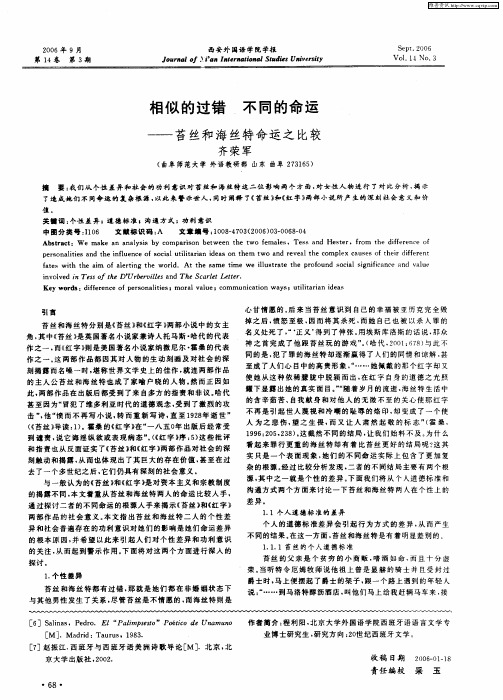
iv le nTe f teD’ br i e n h c r t et . n ov di s o Ure vl s d T e a l t r s h l a S eL e
Ke r s: ifr n e o e s n l i s r lv l eI o y wo d d fe e c fp r o a i e mo a a u c mmu i a in wa s tl a i n i e s t I nc to y u i t ra d a I i
维1 4卷
第 3期
西安 外 国语 学 院 学报 J un l f i nItrain tde nvri o ra ’ nent a Su is i s y o a ol U e t
Se t 20 p . 06 V o .1 o.3 1 4N
文献 标 识 码 : A
文章 编 号 :0 8 4 0 ( 0 6 0 ・ 0 8 0 1 0- 73 2 0 )30 6—4
Ab ta t sr c :W e ma e a n l ss b o k n a a y i y c mp rs n b t e h WO f mae ,Te s a d He t r r m h i e e c f a io e we n t e t e l s s n s e ,fo t e d f r n e o f D r o aiis a d t e i fu n e o o ilu ii ra d a n t e t n e e l h o l x c u e ft e rd fe e t e s n l e n h n l e c f s c a tl a in i e so h m WO a d r v a t e c mp e a s s o h i i r n t t f f t s wi h i o l r i g t e wo l .At t e s me t l s r t h r f u d s c a sg iia c n a u a e t t e a m fa e t h rd h n h a i me we i u t a e t e p o o n o i l i n f n e a d v l e l c
人性视野下苔丝与海斯特命运之比较_李玉艳
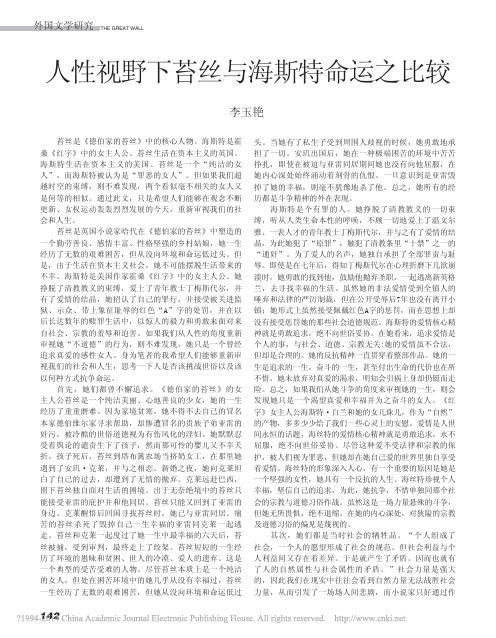
142苔丝是《德伯家的苔丝》中的核心人物。
海斯特是霍桑《红字》中的女主人公。
苔丝生活在资本主义的英国。
海斯特生活在资本主义的美国。
苔丝是一个“纯洁的女人”。
而海斯特被认为是“罪恶的女人”。
但如果我们超越时空的束缚,则不难发现,两个看似毫不相关的女人又是何等的相似。
通过此文,只是希望人们能够在观念不断更新、女权运动轰轰烈烈发展的今天,重新审视我们的社会和人生。
苔丝是英国小说家哈代在《德伯家的苔丝》中塑造的一个勤劳善良、感情丰富、性格坚强的乡村姑娘,她一生经历了无数的艰难困苦,但从没向环境和命运低过头。
但是,由于生活在资本主义社会,她不可能摆脱生活带来的不幸。
海斯特是美国作家霍桑《红字》中的女主人公。
她挣脱了清教教义的束缚,爱上了青年教士丁梅斯代尔,并有了爱情的结晶,她招认了自己的罪行,并接受被关进监狱、示众、带上象征耻辱的红色“A”字的处罚,并在以后长达数年的赎罪生活中,以惊人的毅力和勇敢来面对来自社会、宗教的羞辱和迫害。
如果我们从人性的角度重新审视她“不道德”的行为,则不难发现,她只是一个曾经追求真爱的感性女人。
身为笔者的我希望人们能够重新审视我们的社会和人生,思考一下人是否该挑战世俗以及该以何种方式抗争命运。
首先,她们都曾不懈追求。
《德伯家的苔丝》的女主人公苔丝是一个纯洁美丽、心地善良的少女,她的一生经历了重重磨难。
因为家境贫寒,她不得不去自己的冒名本家德伯维尔家寻求帮助,却惨遭冒名的贵族子弟亚雷的奸污,被冷酷的世俗道德视为有伤风化的淫妇。
她默默忍受着舆论的谴责生下了孩子,然而那可怜的婴儿又不幸夭折。
孩子死后,苔丝到塔布篱农场当挤奶女工,在那里她遇到了安玑·克莱,并与之相恋。
新婚之夜,她向克莱坦白了自己的过去,却遭到了无情的抛弃。
克莱远赴巴西,留下苔丝独自面对生活的困境。
出于无奈绝境中的苔丝只能接受亚雷的庇护并和他同居。
苔丝只能又回到了亚雷的身边。
克莱醒悟后回国寻找苔丝时,她已与亚雷同居。
浅析苔丝与简爱的悲剧命运
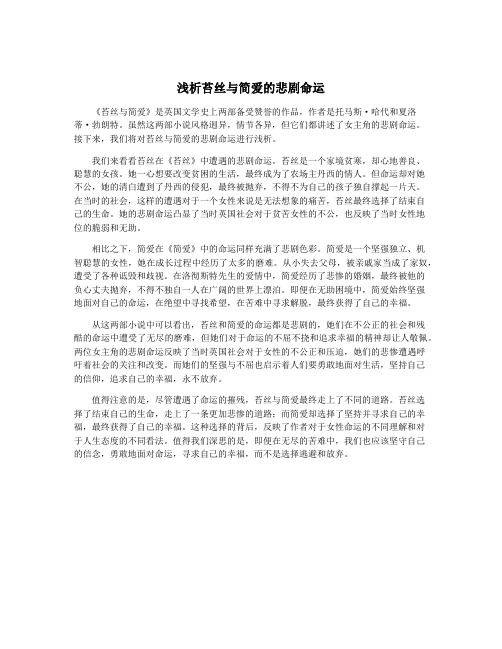
浅析苔丝与简爱的悲剧命运《苔丝与简爱》是英国文学史上两部备受赞誉的作品,作者是托马斯·哈代和夏洛蒂·勃朗特。
虽然这两部小说风格迥异,情节各异,但它们都讲述了女主角的悲剧命运。
接下来,我们将对苔丝与简爱的悲剧命运进行浅析。
我们来看看苔丝在《苔丝》中遭遇的悲剧命运。
苔丝是一个家境贫寒,却心地善良、聪慧的女孩。
她一心想要改变贫困的生活,最终成为了农场主丹西的情人。
但命运却对她不公,她的清白遭到了丹西的侵犯,最终被抛弃,不得不为自己的孩子独自撑起一片天。
在当时的社会,这样的遭遇对于一个女性来说是无法想象的痛苦,苔丝最终选择了结束自己的生命。
她的悲剧命运凸显了当时英国社会对于贫苦女性的不公,也反映了当时女性地位的脆弱和无助。
相比之下,简爱在《简爱》中的命运同样充满了悲剧色彩。
简爱是一个坚强独立、机智聪慧的女性,她在成长过程中经历了太多的磨难。
从小失去父母,被亲戚家当成了家奴,遭受了各种诋毁和歧视。
在洛彻斯特先生的爱情中,简爱经历了悲惨的婚姻,最终被他的负心丈夫抛弃,不得不独自一人在广阔的世界上漂泊。
即便在无助困境中,简爱始终坚强地面对自己的命运,在绝望中寻找希望,在苦难中寻求解脱,最终获得了自己的幸福。
从这两部小说中可以看出,苔丝和简爱的命运都是悲剧的,她们在不公正的社会和残酷的命运中遭受了无尽的磨难,但她们对于命运的不屈不挠和追求幸福的精神却让人敬佩。
两位女主角的悲剧命运反映了当时英国社会对于女性的不公正和压迫,她们的悲惨遭遇呼吁着社会的关注和改变。
而她们的坚强与不屈也启示着人们要勇敢地面对生活,坚持自己的信仰,追求自己的幸福,永不放弃。
值得注意的是,尽管遭遇了命运的摧残,苔丝与简爱最终走上了不同的道路。
苔丝选择了结束自己的生命,走上了一条更加悲惨的道路;而简爱却选择了坚持并寻求自己的幸福,最终获得了自己的幸福。
这种选择的背后,反映了作者对于女性命运的不同理解和对于人生态度的不同看法。
相似的境遇不同的结局苔丝和海丝特性格之比较
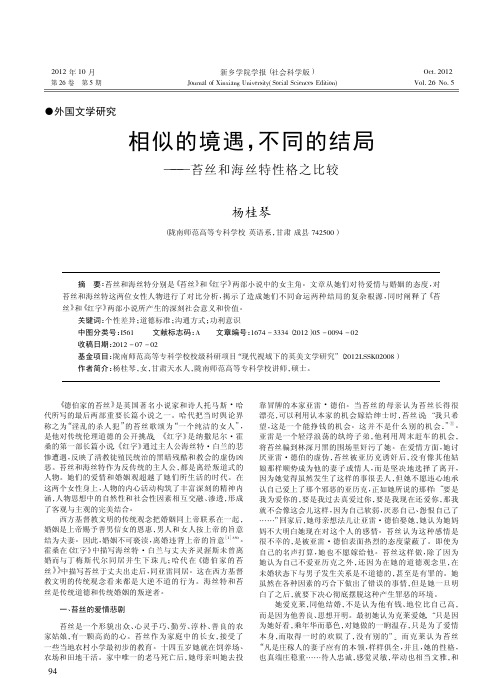
2012年10月新乡学院学报(社会科学版)Oct.2012第26卷第5期Journal of Xinxiang University(Social Sciences Edition)Vol.26No.5●外国文学研究相似的境遇,不同的结局———苔丝和海丝特性格之比较杨桂琴(陇南师范高等专科学校英语系,甘肃成县742500)摘要:苔丝和海丝特分别是《苔丝》和《红字》两部小说中的女主角。
文章从她们对待爱情与婚姻的态度,对苔丝和海丝特这两位女性人物进行了对比分析,揭示了造成她们不同命运两种结局的复杂根源,同时阐释了《苔丝》和《红字》两部小说所产生的深刻社会意义和价值。
关键词:个性差异;道德标准;沟通方式;功利意识中图分类号:I561文献标志码:A文章编号:1674-3334(2012)05-0094-02收稿日期:2012-07-02基金项目:陇南师范高等专科学校校级科研项目“现代视域下的英美文学研究”(2012LSSK02008)作者简介:杨桂琴,女,甘肃天水人,陇南师范高等专科学校讲师,硕士。
《德伯家的苔丝》是英国著名小说家和诗人托马斯·哈代所写的最后两部重要长篇小说之一。
哈代把当时舆论界称之为“淫乱的杀人犯”的苔丝歌颂为“一个纯洁的女人”,是他对传统伦理道德的公开挑战。
《红字》是纳撒尼尔·霍桑的第一部长篇小说,《红字》通过主人公海丝特·白兰的悲惨遭遇,反映了淸教徒殖民统治的黑暗残酷和教会的虚伪凶恶。
苔丝和海丝特作为反传统的主人公,都是离经叛道式的人物。
她们的爱情和婚姻观超越了她们所生活的时代。
在这两个女性身上,人物的内心活动构筑了丰富深刻的精神内涵,人物思想中的自然性和社会性因素相互交融、渗透,形成了客观与主观的完美结合。
西方基督教文明的传统观念把婚姻同上帝联系在一起,婚姻是上帝赐予善男信女的恩惠,男人和女人按上帝的旨意结为夫妻。
因此,婚姻不可亵渎,离婚违背上帝的旨意[1]350。
性格决定命运——苔丝·德伯与海斯特·白兰性格比较
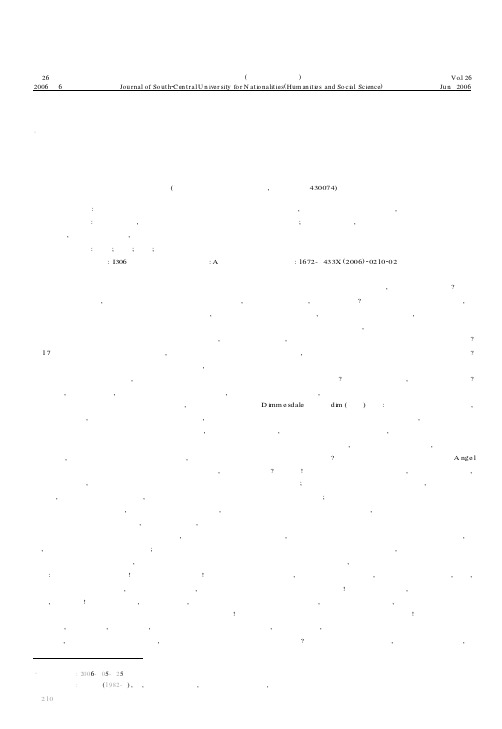
她们对爱人的忠诚是不可否认的, 可是她们的爱人呢? 在她 们受苦的时候, 他们在哪里呢? 年轻的牧师亚瑟·丁梅斯代尔, 也 就是孩子的父亲, 没有勇气和海斯特站在一起, 接受教会的惩罚。 虽然内心的愧疚一直折磨着他, 可他终究还是没有勇气公开自己 的错误, 和海斯特分担痛苦。 他难道就没有想过海斯特的处境吗? 在那个时代, 一个女人需要怎样的勇气和力量才能忍受此等羞辱? 他又怎么能在犯下了教义所不能容忍的“通奸罪”之后依然批着神 圣的外衣为人们祈祷呢? 从某一种意义上看, 他是不是很虚伪呢? 他的爱是自私的, 他爱自己远远多余爱海斯特。 就像他的名字 D imm e sdale 象征着 dim ( 模糊) 一样: 他对海斯特的爱是模糊的, 他对责任承担的意识也是模糊的。作为一名男性, 那时社会的中坚 力量, 面对两难的境地时他选择了逃避, 而不是勇敢地承担自己的 过错。 这对于海斯特而言, 对于任何一名女性而言, 都是一种悲 剧。 而苔丝的爱人呢? 安琪的所作所为是否符合他的名字 A nge l 呢? 当然不! 尽管同当时社会上的男子相比, 他还算是比较开明, 学识丰富的; 他摒弃当时资产阶级严格的等级制度, 梦想着实现理 想体现自己的价值; 与同时代男性不同的是他还尊重女性的权益。 但他始终是来自于资产阶级家庭, 不可避免地受到资产阶级意识 和价值观的影响。 他也是自私的。 尽管我们不能否认他对苔丝深 深的爱, 但他却从来没有平等地对待过苔丝。 他也曾犯过错误, 苔 丝用自己无私的爱原谅了他。在新婚之夜, 苔丝经过无数次的挣扎 后将自己的遭遇告诉了他, 以为安琪能像自己原谅他的过错一样 得到原谅, 可安琪不仅没有原谅她, 反而离弃了苔丝。“噢, 苔丝, 这种事情是不可原谅的! 你以前是一个人, 现在是另一个人了 ……我再说一遍, 我曾经爱的人不是你, 而是和你长相一样的另 一个人。”这就是安琪知道苔丝遭遇后的反应! 他不仅没有安慰 她, 而是火上浇油, 又一次地使苔丝受到了伤害。 他怎么能地苔丝 这么残忍呢? 如果站在苔丝的角度看看, 她当时还根本不懂事, 她
相似的过错不同的命运——苔丝和海丝特命运之比较

相似的过错不同的命运——苔丝和海丝特命运之比较
齐荣军
【期刊名称】《西安外国语大学学报》
【年(卷),期】2006(014)003
【摘要】我们从个性差异和社会的功利意识对苔丝和海丝特这二位影响两个方面,对女性人物进行了对比分析,揭示了造成她们不同命运的复杂根源,以此来警示世人,同时阐释了《苔丝》和《红字》两部小说所产生的深刻社会意义和价值.
【总页数】4页(P68-71)
【作者】齐荣军
【作者单位】曲阜师范大学,外语教研部,山东,曲阜,273165
【正文语种】中文
【中图分类】I106
【相关文献】
1.相似的境遇不同的命运——帕梅拉、苔丝、晴雯三位女性命运之比较 [J], 叶春莉
2.相似的境遇,不同的结局——苔丝和海丝特性格之比较 [J], 杨桂琴
3.相同的抗争不同的命运——试比较简爱与苔丝之命运 [J], 顾兰
4.身世相似命运迥异——简·爱与苔丝命运观比较 [J], 陈坤
5.身世相似命运迥异——简·爱与苔丝命运观比较 [J], 陈坤
因版权原因,仅展示原文概要,查看原文内容请购买。
父权制下苔丝和海斯特爱情悲剧成因对比分析
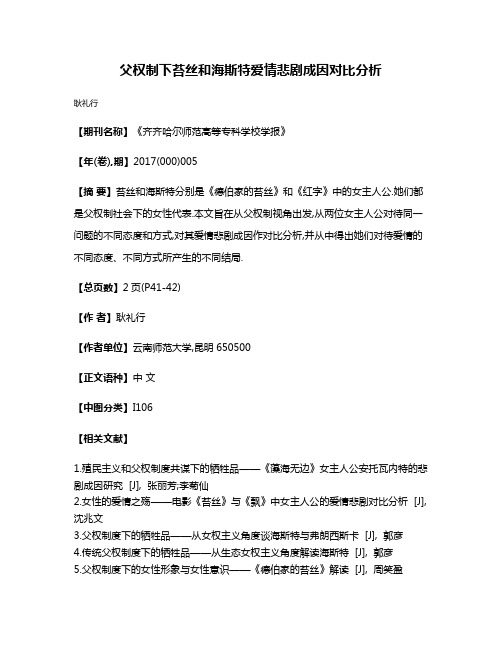
父权制下苔丝和海斯特爱情悲剧成因对比分析
耿礼行
【期刊名称】《齐齐哈尔师范高等专科学校学报》
【年(卷),期】2017(000)005
【摘要】苔丝和海斯特分别是《德伯家的苔丝》和《红字》中的女主人公.她们都是父权制社会下的女性代表.本文旨在从父权制视角出发,从两位女主人公对待同一问题的不同态度和方式,对其爱情悲剧成因作对比分析,并从中得出她们对待爱情的不同态度、不同方式所产生的不同结局.
【总页数】2页(P41-42)
【作者】耿礼行
【作者单位】云南师范大学,昆明650500
【正文语种】中文
【中图分类】I106
【相关文献】
1.殖民主义和父权制度共谋下的牺牲品——《藻海无边》女主人公安托瓦内特的悲剧成因研究 [J], 张丽芳;李菊仙
2.女性的爱情之殇——电影《苔丝》与《飘》中女主人公的爱情悲剧对比分析 [J], 沈兆文
3.父权制度下的牺牲品——从女权主义角度谈海斯特与弗朗西斯卡 [J], 郭彦
4.传统父权制度下的牺牲品——从生态女权主义角度解读海斯特 [J], 郭彦
5.父权制度下的女性形象与女性意识——《德伯家的苔丝》解读 [J], 周笑盈
因版权原因,仅展示原文概要,查看原文内容请购买。
苔丝形象的分析与悲剧命运的解读
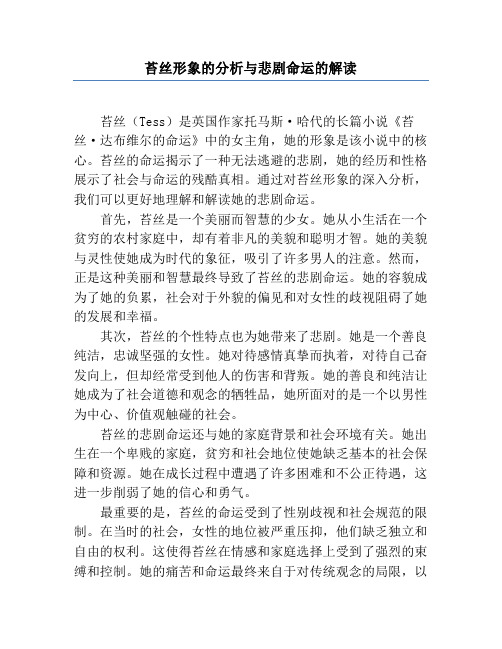
苔丝形象的分析与悲剧命运的解读苔丝(Tess)是英国作家托马斯·哈代的长篇小说《苔丝·达布维尔的命运》中的女主角,她的形象是该小说中的核心。
苔丝的命运揭示了一种无法逃避的悲剧,她的经历和性格展示了社会与命运的残酷真相。
通过对苔丝形象的深入分析,我们可以更好地理解和解读她的悲剧命运。
首先,苔丝是一个美丽而智慧的少女。
她从小生活在一个贫穷的农村家庭中,却有着非凡的美貌和聪明才智。
她的美貌与灵性使她成为时代的象征,吸引了许多男人的注意。
然而,正是这种美丽和智慧最终导致了苔丝的悲剧命运。
她的容貌成为了她的负累,社会对于外貌的偏见和对女性的歧视阻碍了她的发展和幸福。
其次,苔丝的个性特点也为她带来了悲剧。
她是一个善良纯洁,忠诚坚强的女性。
她对待感情真挚而执着,对待自己奋发向上,但却经常受到他人的伤害和背叛。
她的善良和纯洁让她成为了社会道德和观念的牺牲品,她所面对的是一个以男性为中心、价值观触碰的社会。
苔丝的悲剧命运还与她的家庭背景和社会环境有关。
她出生在一个卑贱的家庭,贫穷和社会地位使她缺乏基本的社会保障和资源。
她在成长过程中遭遇了许多困难和不公正待遇,这进一步削弱了她的信心和勇气。
最重要的是,苔丝的命运受到了性别歧视和社会规范的限制。
在当时的社会,女性的地位被严重压抑,他们缺乏独立和自由的权利。
这使得苔丝在情感和家庭选择上受到了强烈的束缚和控制。
她的痛苦和命运最终来自于对传统观念的局限,以及对女性价值的不公正评判。
通过对苔丝形象的深入分析,我们可以看到她的命运是社会的产物,她的遭遇是时代背景和社会制度的必然结果。
哈代通过苔丝的故事向读者展示了社会不公和性别歧视的严重性,揭示了个体与社会力量的悲剧冲突。
正是这种冲突和压迫最终导致了苔丝的悲剧命运。
通过这个悲剧命运的解读,我们可以更好地理解和思考自身所处的社会环境和命运。
苔丝的故事是一个警钟,提醒着我们对于社会不公和个体权利的关注。
我们应该努力争取平等和自由,不被社会压迫和规范束缚。
自古红颜多苦难,然而性格决定命运--苔丝和海斯特性格之比较
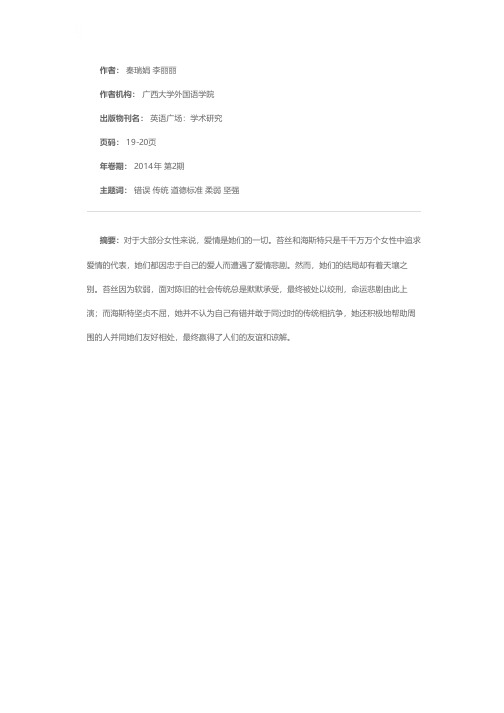
作者: 秦瑞娟 李丽丽
作者机构: 广西大学外国语学院
出版物刊名: 英语广场:学术研究
页码: 19-20页
年卷期: 2014年 第2期
主题词: 错误 传统 道德标准 柔弱 坚强
摘要:对于大部分女性来说,爱情是她们的一切。
苔丝和海斯特只是千千万万个女性中追求爱情的代表,她们都因忠于自己的爱人而遭遇了爱情悲剧。
然而,她们的结局却有着天壤之别。
苔丝因为软弱,面对陈旧的社会传统总是默默承受,最终被处以绞刑,命运悲剧由此上演;而海斯特坚贞不屈,她并不认为自己有错并敢于同过时的传统相抗争,她还积极地帮助周围的人并同她们友好相处,最终赢得了人们的友谊和谅解。
苔丝与海斯特悲剧命运的对比分析
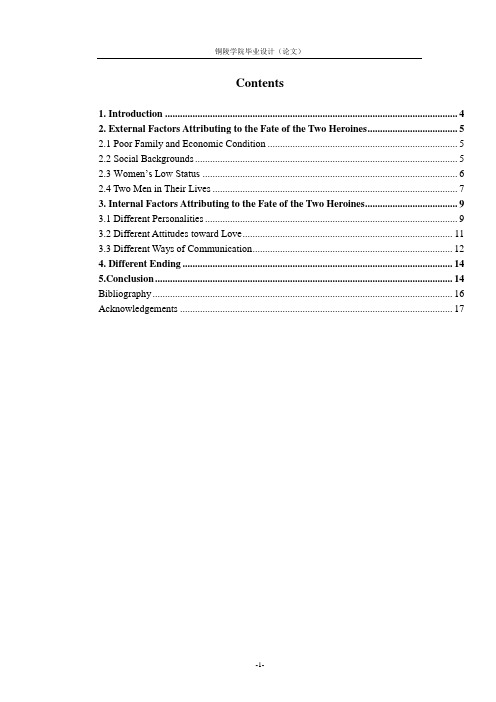
Contents1. Introduction (4)2. External Factors Attributing to the Fate of the Two Heroines (5)2.1 Poor Family and Economic Condition (5)2.2 Social Backgrounds (5)2.3 Women’s Low Status (6)2.4 Two Men in Their Lives (7)3. Internal Factors Attributing to the Fate of the Two Heroines (9)3.1 Different Personalities (9)3.2 Different Attitudes toward Love (11)3.3 Different Ways of Communication (12)4. Different Ending (14)5.Conclusion (14)Bibliography (16)Acknowledgements (17)苔丝与海斯特悲剧命运的对比分析摘要苔丝·德伯和海斯特·白兰分别是哈代和霍桑作品中塑造的两个著名的女性形象。
虽然她们生活在不同的时代,不同的区域,但是两人却有着许多极其相似的地方,特别是她们的悲剧命运和起因。
她们都有着美丽的外表和纯朴善良的心;她们都是两个男人的受害者;她们都经历了痛苦、磨难、反抗和追求幸福的心灵历程。
她们的遭遇都反映了传统道德、虚伪的宗教及男权思想对妇女的压抑和摧残,她们的反抗和追求幸福的历程同样表现了女性对于平等权利和自由的追求。
她们的社会背景和经历极其相似:相似的家庭背景和经济条件,当时妇女地位的低下和两人相似的悲惨遭遇,但同时两个人在性格上又有着很大的不同,从而导致了她们最终命运截然不同。
一个是在与命运的抗争中获得了新生,另一个则在不幸的挣扎中遭到毁灭。
苔丝形象的分析与悲剧命运的解读
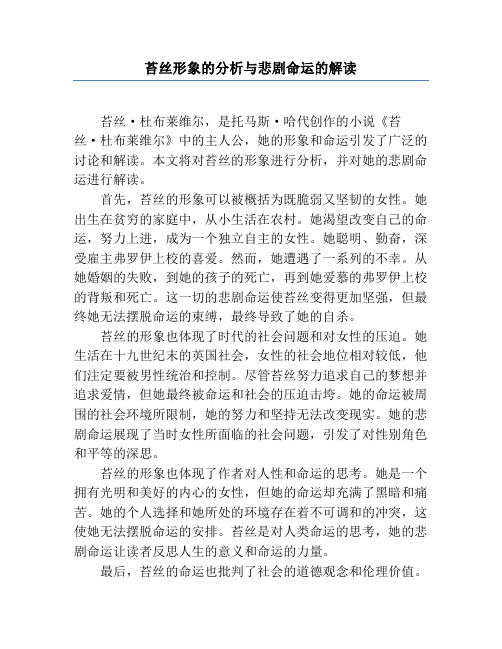
苔丝形象的分析与悲剧命运的解读苔丝·杜布莱维尔,是托马斯·哈代创作的小说《苔丝·杜布莱维尔》中的主人公,她的形象和命运引发了广泛的讨论和解读。
本文将对苔丝的形象进行分析,并对她的悲剧命运进行解读。
首先,苔丝的形象可以被概括为既脆弱又坚韧的女性。
她出生在贫穷的家庭中,从小生活在农村。
她渴望改变自己的命运,努力上进,成为一个独立自主的女性。
她聪明、勤奋,深受雇主弗罗伊上校的喜爱。
然而,她遭遇了一系列的不幸。
从她婚姻的失败,到她的孩子的死亡,再到她爱慕的弗罗伊上校的背叛和死亡。
这一切的悲剧命运使苔丝变得更加坚强,但最终她无法摆脱命运的束缚,最终导致了她的自杀。
苔丝的形象也体现了时代的社会问题和对女性的压迫。
她生活在十九世纪末的英国社会,女性的社会地位相对较低,他们注定要被男性统治和控制。
尽管苔丝努力追求自己的梦想并追求爱情,但她最终被命运和社会的压迫击垮。
她的命运被周围的社会环境所限制,她的努力和坚持无法改变现实。
她的悲剧命运展现了当时女性所面临的社会问题,引发了对性别角色和平等的深思。
苔丝的形象也体现了作者对人性和命运的思考。
她是一个拥有光明和美好的内心的女性,但她的命运却充满了黑暗和痛苦。
她的个人选择和她所处的环境存在着不可调和的冲突,这使她无法摆脱命运的安排。
苔丝是对人类命运的思考,她的悲剧命运让读者反思人生的意义和命运的力量。
最后,苔丝的命运也批判了社会的道德观念和伦理价值。
她所遭遇的悲剧并非都是由她个人的错误、弱点或行为所引起的。
她的命运是一个个别人性的集合,是伦理体系的罪恶。
托马斯·哈代通过苔丝的命运暗示了社会伦理体系存在的问题,批判了社会对个人自由和幸福的压迫。
总之,苔丝·杜布莱维尔的形象和命运在《苔丝·杜布莱维尔》中扮演着重要的角色。
她的形象既体现了女性的脆弱又表现出坚韧,她的命运引发了对社会问题和个人命运的思考。
通过苔丝,读者可以看到对社会、人性和伦理观念的批判,并追问人生的意义和命运的力量。
苔丝形象的分析与悲剧命运的解读

苔丝形象的分析与悲剧命运的解读苔丝形象的分析与悲剧命运的解读约瑟夫•康拉德的小说《黑暗之心》中,苔丝·米勒幕后的形象扮演着至关重要的角色。
她是一位情感丰富、聪明才智的女性,但却面临着不幸的命运。
通过对苔丝形象的分析,我们可以深入探讨她的悲剧命运,并思考人性与社会环境对人的影响。
首先,苔丝的形象呈现出一种矛盾而复杂的内心世界。
她出生于贫穷的家庭,具有聪慧和敏感的天赋。
她对知识的渴望和追求使她在封闭的社会环境中成长,并且不断挑战既定的权威。
然而,她的进步与自由思想激起了社会的反对和压抑。
苔丝的自由意识被视为异端,并遭受到严厉的批判和惩罚。
她的命运与她的自由意志发生了冲突,这使她陷入痛苦和困惑之中。
苔丝的悲剧命运不仅是由于内在矛盾,也受到了社会环境的严酷限制。
在小说中,康拉德通过精心描绘当时的社会背景,展现了社会道德与个体意愿之间的冲突。
苔丝生活在一个男权至上、传统保守的社会中,在这个社会中,女性的地位受到极大的限制和剥夺。
她的理想和渴望要靠个人奋斗,这无疑是巨大的挑战。
社会对苔丝的种种压迫使她的梦想变得不可能实现,尽管她有着坚定的意志和努力,但最终她的命运被摧毁了。
苔丝的悲剧命运也与她对爱情的追求和无法实现的婚姻有关。
她爱上了德里克·罗彻斯特,一个属于上层社会的男人。
尽管他们的感情是真实的,但却受到了那个时代的种种禁锢和阻碍。
苔丝面临着家庭、财富和地位的巨大压力,这使她最终选择了放弃自己的爱情。
她的命运受到了社会等级和家庭利益的束缚,无法逃脱悲剧的结局。
苔丝的悲剧命运引发了对人性和社会环境的思考。
她的形象向我们揭示了一个普遍而深刻的主题:个体意愿与社会规则之间的冲突。
她渴望自由与进步,但社会的束缚和限制使她无法实现这些追求。
苔丝的悲剧命运向我们展示了人性的脆弱和社会环境对人的深远影响。
她的故事呼唤着对社会正义与个人权利之间的平衡的思考,同时也让我们反思当代社会中是否存在类似的问题和现象。
比较文学
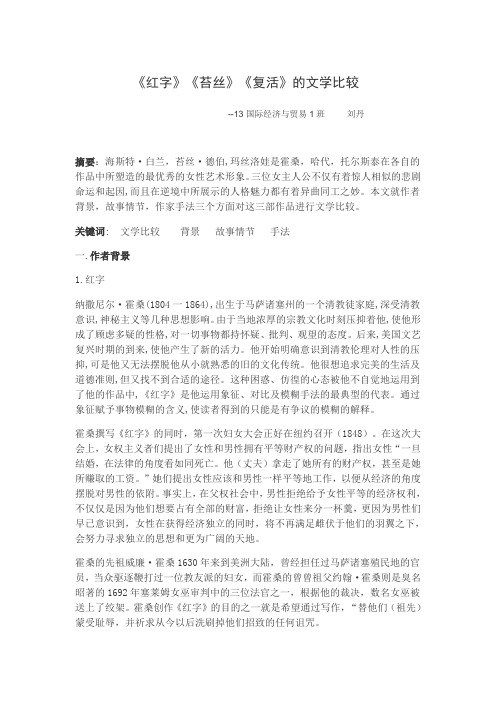
《红字》《苔丝》《复活》的文学比较--13国际经济与贸易1班刘丹摘要:海斯特·白兰,苔丝·德伯,玛丝洛娃是霍桑,哈代,托尔斯泰在各自的作品中所塑造的最优秀的女性艺术形象。
三位女主人公不仅有着惊人相似的悲剧命运和起因,而且在逆境中所展示的人格魅力都有着异曲同工之妙。
本文就作者背景,故事情节,作家手法三个方面对这三部作品进行文学比较。
关键词: 文学比较背景故事情节手法一.作者背景1.红字纳撒尼尔·霍桑(1804一1864),出生于马萨诸塞州的一个清教徒家庭,深受清教意识,神秘主义等几种思想影响。
由于当地浓厚的宗教文化时刻压抑着他,使他形成了顾虑多疑的性格,对一切事物都持怀疑、批判、观望的态度。
后来,美国文艺复兴时期的到来,使他产生了新的活力。
他开始明确意识到清教伦理对人性的压抑,可是他又无法摆脱他从小就熟悉的旧的文化传统。
他很想追求完美的生活及道德准则,但又找不到合适的途径。
这种困惑、仿徨的心态被他不自觉地运用到了他的作品中,《红字》是他运用象征、对比及模糊手法的最典型的代表。
通过象征赋予事物模糊的含义,使读者得到的只能是有争议的模糊的解释。
霍桑撰写《红字》的同时,第一次妇女大会正好在纽约召开(1848)。
在这次大会上,女权主义者们提出了女性和男性拥有平等财产权的问题,指出女性“一旦结婚,在法律的角度看如同死亡。
他(丈夫)拿走了她所有的财产权,甚至是她所赚取的工资。
”她们提出女性应该和男性一样平等地工作,以便从经济的角度摆脱对男性的依附。
事实上,在父权社会中,男性拒绝给予女性平等的经济权利,不仅仅是因为他们想要占有全部的财富,拒绝让女性来分一杯羹,更因为男性们早已意识到,女性在获得经济独立的同时,将不再满足雌伏于他们的羽翼之下,会努力寻求独立的思想和更为广阔的天地。
霍桑的先祖威廉·霍桑1630年来到美洲大陆,曾经担任过马萨诸塞殖民地的官员,当众驱逐鞭打过一位教友派的妇女,而霍桑的曾曾祖父约翰·霍桑则是臭名昭著的1692年塞莱姆女巫审判中的三位法官之一,根据他的裁决,数名女巫被送上了绞架。
苔丝和海藻的悲剧成因对比探析
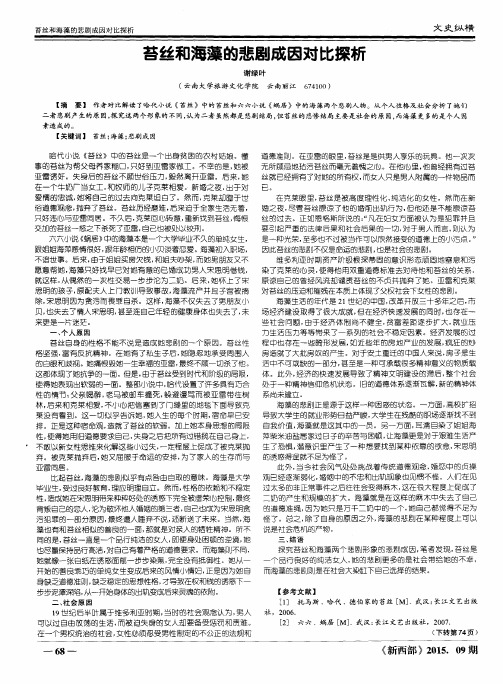
跟姐 姐海萍 感情很 好 , 跟年 龄相仿 的小贝 谈着 恋爱 。 海 藻初入 职场 , 不 谙世 事 。后 来 , 由于姐 姐买 房欠钱 , 和 姐夫吵 架 , 而她 男朋友 又不 愿 意帮 她 , 海藻 只好 找 早 已对她 有 意 的已 婚成 功 男人 宋思 明借 钱 , 就 这样 , 从 偶然 的一 次 性交 易 一步 步沦 为 二奶 。后来 , 她 怀 上 了宋 思 明 的孩 子 , 原 配夫 人上 门教 训l 导致 事故 , 海 藻流 产 并且 子 宫被 摘 除, 宋思 明 因为 贪污 而畏 罪 自杀 。这 样 , 海藻 不仅 失 去 了男朋 友 小 贝, 也 失去 了情 人宋思 明 , 甚 至 连自 己年轻 的健 康身体 也失 去 了, 未 来更是 一片迷 茫 。
二者 悲剧产 生的 原因 , 探 究这 两个形 象的不同 , 认为二者 虽然都是 悲剧结局 , 但苔 丝的悲惨 结局主要是社会 的原因 , 而海藻更 多的是 个人 因 素造成的。
【 关键词 】 苔丝 ; 海藻 ; 悲剧成 因
哈代小说 《 苔丝 》 中的 苔 丝是 一个 出身 贫困 的农 村 姑娘 。懂 事 的苔 丝 为帮 父母 养 家糊 口 , 只好 到 亚雷 家做 工 。不 幸的 是 , 她被 亚 雷诱 奸 。失身 后 的 苔丝 不顾 世俗 压 力 , 毅然 离 开亚 雷 。后来 , 她 在 一个 牛 奶厂 当 女工 , 和 牧师 的儿 子 克莱 相爱 。新婚 之夜 , 出于对
苔丝和海藻的悲剧成因对比探析
文 史 纵横
苔丝和海藻的悲剧成因对比探析
谢绿 叶
( 云 南大 学旅 1 0 0)
要 】 作者对比解读 了哈代 小说 《 苔丝 》中的苔 丝和六六小说 《 蜗居 》中的海藻 两个 悲剧人物 。从 个人性格及社会 分析 了她们
从表现形式看《苔丝》的悲剧性

3142014年3月下半月刊艺术文化交流一、绪论一提到悲剧,人们就会想到埃斯库罗斯、莎士比亚或者悲剧杰作《俄狄浦斯王》《哈姆雷特》等,很少有人很把托马斯•哈代与悲剧联系在一起。
这大慨与传统悲剧定义有关——局限于古典、拘泥于戏剧。
而哈代的创作以小说为形式,且现实主义倾向明确,又因为作品中以普通凡人为主角,注重描写基于现实生活的矛盾和冲突。
然而,当我们阅读《苔丝》时,从审美角度看,会因主要人物的命运而感到怜悯与恐惧,并被其强大的艺术力量所吸引,这种情感体验与观赏古典悲剧(所谓的正宗悲剧)时的感受同样强烈,哈代让我们真切地看到了普通人的悲剧。
二、表现形式与悲剧效果本文从哈代小说《苔丝》中的形式特点做分析,并将这些形式特点与小说总体的悲剧效果的关系作出评估。
(一)隐喻的巧妙运用,增强悲剧效果隐喻在小说中时时彰显,不仅奠定了整个篇章的忧郁气氛、并且为人物命运埋下伏笔。
在小说的开头和结尾分别向我们展示了两个相似的场景展现,寓意着苔丝经历的不幸。
第一个场景是:克莱尔回头向路边望去,看见那群穿白衬衣的村女在春天地草地上跳着舞,苔丝这时还与同伴在一起,她站在树篱旁边。
另一个场景是:克莱尔在他认为已与苔丝作最后分别之后,回头望那空旷的乡野和那条空荡荡的路,只见远处空旷灰白的画面上,一个跑动着的人影。
那是已经脱离人群而完全孤立了的苔丝。
两个相似的场景一头一尾遥相呼应,前面对后面是提前的预示,后面则成为前面的回应:寓意着苔丝从被发现到被遗弃的不幸经历。
隐喻的安排对悲剧效果的提升非常有效。
最突出的是小说快结束时,哈代又用巧妙生动的总结形式,让我们完整的重温了苔丝的全部经历过程。
庄园主的空房子,相当于他们新婚之夜的古宅、荒凉的索尔兹伯里平原相当于弗林库姆-阿什高地。
悬石坛的一幕既与墓穴栖身相呼应,也与她像一个祭神品靠在十字架旁休息相呼应,这也是在她生命即将结束时所反映出的她的悲惨一生的缩影。
哈代所用的隐喻是含蓄而深沉的。
关于苔丝和海丝特的悲剧对比分析
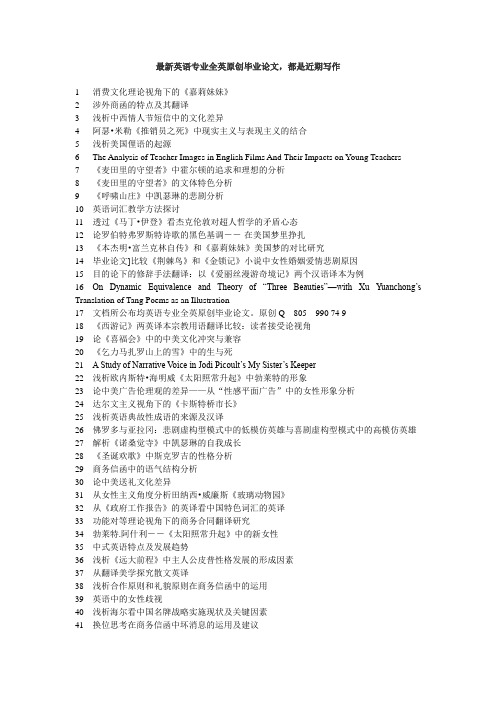
最新英语专业全英原创毕业论文,都是近期写作1 消费文化理论视角下的《嘉莉妹妹》2 涉外商函的特点及其翻译3 浅析中西情人节短信中的文化差异4 阿瑟•米勒《推销员之死》中现实主义与表现主义的结合5 浅析美国俚语的起源6 The Analysis of Teacher Images in English Films And Their Impacts on Young Teachers7 《麦田里的守望者》中霍尔顿的追求和理想的分析8 《麦田里的守望者》的文体特色分析9 《呼啸山庄》中凯瑟琳的悲剧分析10 英语词汇教学方法探讨11 透过《马丁•伊登》看杰克伦敦对超人哲学的矛盾心态12 论罗伯特弗罗斯特诗歌的黑色基调---在美国梦里挣扎13 《本杰明•富兰克林自传》和《嘉莉妹妹》美国梦的对比研究14 毕业论文]比较《荆棘鸟》和《金锁记》小说中女性婚姻爱情悲剧原因15 目的论下的修辞手法翻译:以《爱丽丝漫游奇境记》两个汉语译本为例16 On Dynamic Equivalence and Theory of “Three Beauties”—with Xu Y uanchong’s Translation of Tang Poems as an Illustration17 文档所公布均英语专业全英原创毕业论文。
原创Q 805 990 74 918 《西游记》两英译本宗教用语翻译比较:读者接受论视角19 论《喜福会》中的中美文化冲突与兼容20 《乞力马扎罗山上的雪》中的生与死21 A Study of Narrative V oice in Jodi Picoult’s My Sister’s Keeper22 浅析欧内斯特•海明威《太阳照常升起》中勃莱特的形象23 论中美广告伦理观的差异——从“性感平面广告”中的女性形象分析24 达尔文主义视角下的《卡斯特桥市长》25 浅析英语典故性成语的来源及汉译26 佛罗多与亚拉冈:悲剧虚构型模式中的低模仿英雄与喜剧虚构型模式中的高模仿英雄27 解析《诺桑觉寺》中凯瑟琳的自我成长28 《圣诞欢歌》中斯克罗吉的性格分析29 商务信函中的语气结构分析30 论中美送礼文化差异31 从女性主义角度分析田纳西•威廉斯《玻璃动物园》32 从《政府工作报告》的英译看中国特色词汇的英译33 功能对等理论视角下的商务合同翻译研究34 勃莱特.阿什利--《太阳照常升起》中的新女性35 中式英语特点及发展趋势36 浅析《远大前程》中主人公皮普性格发展的形成因素37 从翻译美学探究散文英译38 浅析合作原则和礼貌原则在商务信函中的运用39 英语中的女性歧视40 浅析海尔看中国名牌战略实施现状及关键因素41 换位思考在商务信函中坏消息的运用及建议42 The Application of Cooperative Learning in Senior High School English Writing Class43 文化战略及其对汉译英的影响44 分析《绯闻女孩》中的美国社会文化特征45 论《财神和爱神》中十九世纪末美国社会的阶级冲突及解决46 浅析《德伯维尔家的苔丝》中造成苔丝悲剧的因素47 英语新闻标题的前景化48 论《野性的呼唤》中的自然主义49 浅析奥利奥品牌在国际营销中的跨文化策略50 从伦理道德的角度解读《红字》中的清教主义51 从《红楼梦》和《飘》看中美恭维语比较52 从叔本华的哲学思想角度简析《德伯家的苔丝》中苔丝的悲剧53 写作教学中的范文教学54 《荒原》中的神话溯源55 新闻英语标题的特点和翻译56 概念整合对英语移就的认知解读57 简析比喻在《围城》中的运用58 论大学英语口语课外活动59 从后殖民主义看《贫民窟的百万富翁》的成功60 《罗密欧与朱丽叶》和《牡丹亭》中女性主义意识的对比研究61 紫色中女人意识的觉醒62 Nonverbal Communication Used in Different English Teaching Stages63 不可缺少的书信——《傲慢与偏见》中书信功能的研究64 探究《紫色》中的妇女主义者形象65 The Religious Thoughts in The Pilgrim’s Progress66 A Feministic Study of the Theme of “The Chrysanthemums”(开题报告+论文+文献综述)67 On Nonequivalence of “Ren Min” in Chinese Legal Texts to “People”: From the Perspective of Cultural Comparison68 从目的论角度分析商业电视广告中双关语的翻译69 从《红楼梦》两个译本论归化翻译和异化翻译70 中国人和美国人特征的比较71 目的论在公司宣传广告英译中的应用72 《麦琪的礼物》的叙事技巧分析73 《麦琪的礼物》的叙事技巧分析74 文化视角下的英汉习语对译(开题报告+论文+)75 非英语专业大学生听力课堂焦虑的影响及解决策略76 从冲突到和解—解析《接骨师之女》中的母女关系77 旅游景点标志翻译初探78 礼貌策略在商务信函中的应用79 从《竞选州长》看马克•吐温的幽默艺术80 《了不起的盖茨比》和美国现代社会81 论《动物庄园》的反讽艺术82 经贸英语中的缩略语现象及其应用83 论《简爱》中的女性意识84 《哈利波特》系列小说的浪漫主义情节分析85 从警察与赞美诗中分析欧亨利的写作风格86 杰克伦敦对马丁伊登悲剧的影响87 An Analysis of Sexism in English Proverbs88 杰克•伦敦《热爱生命》中天气描写的作用89 中学英语口语互动教学的现状及存在的问题90 论《傲慢与偏见》中的妇女地位问题91 游戏教学在小学英语课堂中的运用92 中国特色词汇及其翻译93 有关小学双语教学现状及实施问题分析94 教师在农村初中英语游戏教学中的角色分析--以某中学为例95 《最蓝的眼睛》中的自我迷失和身份寻求96 从《雾都孤儿》看查尔斯•狄更斯的善恶观97 他者形象:最逆来顺受与最狂野的—中国女性在西方电影中的形象98 解析《麦田里的守望者》中帽子和鸭子的象征意义99 浅议我国民营企业薪酬管理100 弗朗西斯•培根论说文风格传译策略研究101 A Comparison of the English Color Terms102 从杨必翻译的《名利场》看文学翻译中的归化与异化103 On Classification of Chinese Dish Names and Their Translation Strategies 104 试论《最蓝的眼睛》中黑人理想家庭的破灭105 浅析法律英语的词汇特点及其翻译106 电影《木兰》中的动物形象反映的中西文化差异107 浅析模糊语在商务谈判中的应用108 玛丽•巴顿的女性意识109 英语非作格动词语义特征和句法属性研究110 浅谈体态语在小学英语教学中的作用111 《双城记》与《呼啸山庄》的家庭主题对比112 至美的追求—美学视角下泰戈尔的《吉檀迦利》113 《呼啸山庄》中爱与恨的冲突与交融114 浅析哈克贝利的叛逆精神115 文化负载词的翻译策略116 顺从还是叛逆——解读《汤姆叔叔的小屋》中的基督教义精神117 从人格特质理论探析简爱的个人特质118 有效的英语新闻结构分析119 托马斯·哈代《无名的裘德》中的异化120 从《飘》中人物性格分析看适者生存的道理121 析《麦田里的守望者》主人公霍尔顿的人生选择122 《幸存者回忆录》中多丽丝•莱辛的生态观123 小说《鲁滨逊漂流记》中的精神力量分析124 高中生英语学习成败归因现状调查及对策125 从《老友记》探究美国的个人主义价值观126 论中西文化中家庭观念的差异127 从文化视角看英语习语的翻译128 论例句在中学英语课堂中的应用129 跨文化交际中的社交语用失误及其对英语教学的启示130 堂娜•哈拉维的赛博女性主义分析131 莎士比亚《皆大欢喜》中的标新立异132 浅谈中西方非言语交际中身势语差异133 论英汉习语中的动物文化134 中英习语文化异同及其翻译135 简论爱伦•坡的建筑意象136 隐喻在英语新闻标题中的功能137 哈代的女性观在苔丝中的反映138 体育专有名词的翻译研究139 On Aesthetic Value of Thomas Hardy’s Poems140 中英文隐喻对比研究141 高中英语听、说、读教学活动中写作融入模式的初探142 从中西方文化差异看中国式英语143 目的论视角下旅游景区公示语误译的研究144 中美奢侈品消费行为差异背后的文化影响研究145 浅谈美国职场上的性别歧视及其原因146 A Study on Differences of Family Education between China and America--A Case Study of The Joy Luck Club147 从合作原则分析《老友记》中的人物性格刻画148 浅析中世纪欧洲基督教婚姻伦理观149 从《简•爱》与《藻海无边》看女性话语权的缺失150 从生态女性主义角度解读朱厄特的《白苍鹭》151 从中英文化差异谈英语隐喻的汉译152 从好莱坞电影中吸血鬼形象的演变看人性冲突153 现代叙事艺术与海明威的《永别了武器》154 A Study on the Cross-Cultural Management in the Sino-American Joint-Venture Enterprises --With Special Reference to Changan & Ford Motor Company155 英汉称谓语对比分析156 寂静的声音——《送菜升降机》中的沉默157 浅谈商务英语合同的翻译158 简单的深邃—论佛洛斯特诗歌的隐秘性159 《隐形人》中格里芬的心理剖析160 《老人与海》中圣地亚哥人物形象的特点探析161 学前英语游戏教学法162 探析王尔德童话中的死亡主题163 论《紫色》的叙事现代性分析164 浅谈英汉禁忌语的发展165 从文化差异比较研究中美家庭教育166 商务英语谈判的翻译技巧167 由英汉委婉语的对比研究来看中西文化的差异168 从文化翻译学行为论看汉语国俗语的英译过程——对林语堂和《吾国吾民》的个案考察169 从好莱坞电影中的中国形象变化分析中国在西方人眼中的形象变化及原因170 分析狄更斯成长小说的主人公171 A Study on Theme Slogan Translation—from the Perspective of Functional Equivalence Theory172 A Comparison of the English Color Terms173 伊迪斯•华顿《纯真年代》中的新女性形象174 论中西方交际方式的差异175 哈姆雷特的悲剧性格分析176 《野性的呼唤》中的自然主义177 从王尔德的童话看其悲观主义爱情观178 试析《推销员之死》中威利•洛曼的美国梦179 网络环境下英语专业学生学习策略研究180 论英语电影在英语学习中的作用181 从合作性原则看品牌代言中广告语的使用182 一个自我矛盾的精神世界—《达洛卫夫人》中的对照与一致183 从认知的角度来看主动语态在商务信函中的语用功能184 浅析合作原则和礼貌原则在商务信函中的运用185 论《阿芒提拉多酒桶》中文学手法的运用及其艺术效果186 文化背景下英文电影名称的中译187 技术性贸易壁垒对中国外贸行业的影响—以CR法案为例188 “美国梦”的再探讨—以《推销员之死》为例189 浅析英诗翻译的原则和方法——丁尼生《鹰》的不同译文比较190 An Application of Schema Theory in Interpreting191 女性主义视野下林黛玉与简•爱的比较研究192 语用学理论在经贸英语口译中的应用193 海明威文学作品中青年和老年人物关系对比探究194 从《永别了,武器》看海明威的战争观195 从《法国中尉的女人》看约翰福尔斯的女性主义思想及其局限性196 英汉“走类”动词短语概念隐喻的对比研究197 英语报刊标题的词汇特点和修辞特点198 A Comparison of the English Color Terms199 “I”and Rebecca--A Study on the Comparison of Two Female Characters in Rebecca 200 Maintaining and Revitalizing the Native American Languages。
同途不同归:海斯特与苔丝

第9卷第4期V o l.9,N o.4长安学刊Changan Xue Kan2018年6月Jun. ,2018同途不同归:海斯特与苔丝蔡路依(长沙理工大学文法学院湖南长沙410000)摘要:海斯特•白兰和苔丝•德伯,是霍桑的《红字》和哈代的《苔丝》中所塑造的优秀的女性艺术形 象。
处于不同时代和国别的两位女主人公虽然有着惊人相似的命运轨迹,却有着不同的结局。
文章对比分 析了两位女主的生活背景及个性,从她们选择的佘地来看其自主性,从她们相同的自由限度,和面对选择时 不同的自主性推出导致她们不同结局的原因,同时从苔丝与海斯特的形象塑造上窺见哈代女性观的局限性 与霍桑某种程度上的超性别意识。
分析对比《苔丝》和《红字》,对于我们理解人类共同面对的男女问题有一 定的启示。
关键词:海斯特;苔丝文章编号:978 - 7 -80736 - 771 - 0(2018)04 -100 - 03_、自由的限度《苔丝》是英国作家哈代的代表作,批评家莫布雷•莫里斯在《文化与无政府主义》一文中批评哈代用一种 极其令人厌恶的方式讲了一个极其令人厌恶的故事1,哈代思想的超前性可见一斑。
故事发生在维多利亚时 期,那时的女性在家庭中处于服从地位,新教对婚姻赞 成和对伴侣之爱的要求本身也促进了妻子的顺从,妇女 被期望婚后珍爱他们的丈夫,并被教导说这是她们神圣 的义务。
如此之爱,实际被妇女内在化,使妻子很容易 接受顺从丈夫意愿的地位。
文艺复兴和宗教改革并没 有改变这种“男尊女卑”的观念。
在这个时代的观念中,苔丝年幼遭奸污,婚后遭遗弃,又与奸污她的人同居,这 样的女人是不贞洁的,甚至是淫邪的。
而亚雷•德伯是 资产阶级纨绔弟子的代表,诱奸苔丝之后又披上宗教外 衣招摇撞骗,这样一个屡屡犯罪的人,尚能在社会上逍 遥法外,不受任何惩罚和谴责,而作为受害者的苔丝却 一直背着“不洁”的黑锅,被社会排挤唾弃。
安玑•克莱 尔,作为一个进步青年,亦难以脱离当时男权文化的藩 篱。
苔丝和海斯特悲剧命运的比较
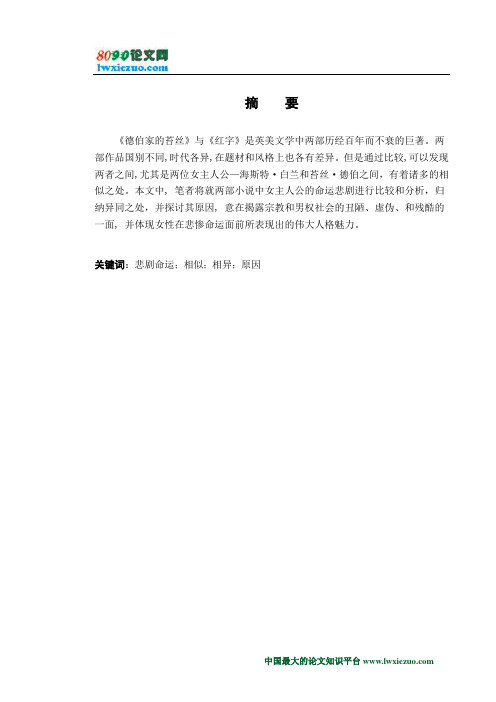
摘要《德伯家的苔丝》与《红字》是英美文学中两部历经百年而不衰的巨著。
两部作品国别不同,时代各异,在题材和风格上也各有差异。
但是通过比较,可以发现两者之间,尤其是两位女主人公—海斯特·白兰和苔丝·德伯之间,有着诸多的相似之处。
本文中, 笔者将就两部小说中女主人公的命运悲剧进行比较和分析,归纳异同之处,并探讨其原因, 意在揭露宗教和男权社会的丑陋、虚伪、和残酷的一面, 并体现女性在悲惨命运面前所表现出的伟大人格魅力。
关键词:悲剧命运;相似;相异;原因ABSTRACTTess of the D’Urbervilles and The Scarlet Letter are two great works, which have come through hundreds of years not to fade in the British and American literature. They are different in the writers‘ nationalities and living time, and have the difference respectively in the theme and the style. But through the comparison, we can find numerous similarities between these two works, especially the two heroines - Hester and Tess. In this article, the author is going to carry on the comparison between these two heroines' tragic destiny, concluding the similarities and differences as well as discussing the reasons, with the intension of exposing the ugly, hypocritical and brutal face of the religion and male-power society, which will also show the charm of the females‘ great personality displayed in front of the pitiful destiny.Keywords:tragic destiny; differences ; similarities; reasonsContents1. Introduction (1)2. Similarities and differences of the tragic destiny (2)2.1 Similar destinies (2)2.1.1 Poor family (2)2.1.2 Unfortunate youth (3)2.1.3 Hypocritical lover (3)2.1.4 Social critics (5)2.2 Different ending (6)3. Reasons of the tragic destinies (7)3.1 Writer‘s thoughts of writing (7)3.1.1 Hardy‘s fatalism (7)3.1.2 Hawthorn‘s view of sin (9)3.2 Chara cter‘s living environments (10)3.2.1 Economic condition (10)3.2.2 Political status (10)3.2.3 Cultural backgrounds (12)3.3 Character‘s thoughts (14)3.3.1 Tess‘s hesitance in resisting tradition (14)3.3.2 Hester‘s insistence in countering tradition (15)4. Conclusion (16)Acknowledgements (16)References (16)1.IntroductionTes s of the D’Urbervilles is continuously considered as Hardy‘s greatest and most artistically charming one in his representative works. The work describes the bankruptcy of the small peasant economy and the process that the farmer moves towards impoverishment in the end of 19 century when capitalism invades the countryside, as well as the main character Tess‘s tragic destiny in this background. Tess has beautiful appearance, strong will and warm sentiment. Meanwhile, she also had honesty and simple characteristic that comes from nature. She deeply loves life. For love, she dares facing any difficultly. However she is finally delivered to the gallows.[3]50The Scarlet Letter is the famous writer Hawthorne's representative work. The work, through vivid description of special destiny caused by different characters under the specific background of New England in the American colonial period, creatively deducts the oppression to Hester in the patriarchal society. The feminine image of Hester, who advocates feminism and pursues romantic love, has displayed especially outstanding in the Puritanism society. Although she is strong, brave, industrious, kind, and has lofty self-devotion, finally only to turn out the tragic ending.2. Similarities and differences of the tragic destiny2.1 Similar destiniesThere are so many common grounds between the tragic destinies of the leading characters Tess and Hester. The two heroines almost have gathered all merits of feminine: to be intelligent, beautiful, industrious, good, chaste, tolerant and brave, to love faithfully, to be extremely positive to life. Being the outstanding females who have innumerable merits, they both have experienced similar pitiful destiny, being faced with economy‘s impoverishment, youth‘s misfortune, lover‘s hypocrisy and society's discrimination. Both of them were born in the impoverished declining family; both have lost the happy youth; both deeply love the leading male character, and sacrifice their own life happiness as the price for pursuing their chaste love, but suffer abandonment of the deceptive and selfish hypocrites; both experience suffering society's extreme insult and critique in their life. After full persecution from all sorts of visible or invisible evil influence of society, they end in the pitiful sacrificial victims.2.1.1 Poor familyTess was born in a poor farmer family, a declining aristocratic one. The straitened financial circumstance of the family makes her live with great difficulty. From the very beginning of the story, her family occupies the poor farmer's status. When the nag, the only economic basis of their livelihood, is hit and dies, the family goes bankrupt immediately. It is only then that Tess steps onto a road different from the past. Because of the bankrupt, Tess has no other choice but to claim kin with D'Urbervilles family in Trantridge, a counterfeit relative with same surname.Hester is extremely similar to Tess in the family background. She also lives in the bottom of society with an impoverished fam ily, having no alternatives. It‘s an ancient aristocratic family of the old England, which declines gradually; naturally there is no big wild hope about marriage in her. It is also out of the helpless life that the parents marry her with an old man, who is bodily feeble and abnormal.2.1.2 Unfortunate youthThe concomitance that follows the special poor of Tess‘s and Hester‘s families is their unfortunate youth. Besides the outstanding appearance with natural beauty, both Hester and Tess have a simple and kind heart. However, in their years of youth and beauty, these God's gracious gifts have not brought corresponding happiness to them. On the contrary, they have brought Tess‘s chastity and Hester‘s youth into great ruin.As the eldest daughter of the family, facing the poor condition, Tess only has to go to the rich D'Urbervilles family and recognize each other as members of the same clan, so as to get out of the difficult situation by the time. Who knows the household is an impostor that gains fame and fortune from business, makes great strides forward the rural gentry‘s ranks with money, and changes the original surname into D'Urbervilles! What‘s more, the only son of Mrs. D'Urberville, Alec D'Urberville, is a frivolous amorist, a buck who idles about all day long. Although Tess shows extreme loathe, trying to keep off on her guard against this bourgeoisie playboy everywhere, the young and ignorant girl finally suffers seducement of this impudent and shameless man, getting into the first step of her unfortunate life.At the time when Hester has no sense of choosing love, her beautiful appearance attracts Roger Chillingworth. The senior scholar, who is in senile decay and bodily malformation, entices her to enjoy life along with him. For one thing, the family is declining; for another, the young pure Hester still doesn‘t know what love actually is. Then, she marries him without thought. Hereafter, the old man indulges all day long in the books of decrees and regulations, very little caring about his young beautiful lovely wife. With the mental disparity and age‘s gap, it is naturally difficult to have sympathetic chord and harmony in their emotion. The marriage that is ―like a tuft of green moss on a crumbling wall‖ [1]10 has caused Hester to live lonely and depressively day and day. Thus, the unfortunate marriage without love kills Hester‘s fine youth earlily, beginning the prologue of her life tragedy. [4]952.1.3 Hypocritical loverAngel Clare‘s love to Tess and Dimmesdale‘s to Hester has a tinge of sincerity, but only before involving social morals, religion and law which they abide. By penetrating these pitiful true feelings, we are not difficult to find the selfishness and hypocrisy in their bones. [3]53When Tess makes a new start of her independent life on the dairy farm, she falls in love with pastor's son Angel Clare. Her short happiness henceforth starts, but bigger misfortune also follows. On the wedding night, out of her loyalty, Tess confesses the bitter experience which has deprived her chastity. Unexpectedly, what she encounters is Clare‘s heartless abandonment. Clare‘s behavior indicates that, he is still the faithful son of the capital society. He loves Tess just because of her beauty. She can work, and might become his primary assistant in future. Their union, for him, is not established on the foundation of true love, but more on his egotism. Therefore, when Tess confesses the past events to him, he displays extreme selfishness, hypocrisy and callousness to her, without the minimum sympathy and forgiveness, in spite of his similar experience. It is he that has aroused Tess‘ expectation for new life, and also it is he who causes Tess to lose her own fantasy with great pain. If it is Alec who has ruined Tess‘s body and ended the happiness of her living, then it is Angel Clare who spiritually gives Tess the most striking blow, ending her short life.With no common thoughts and feelings with the husband, during the period of widowhood in the American Boston, Hester breaks through the fetters of her unfortunate marital, falls in love with young pastor Dimmesdale without scruple, and brings their love crystallization ——the daughter Pearl. But she has also paid high price for this. She is put into jail for adultery by the judgment of Puritanism law court, the chest wearing a red character A (adultery) as a sample of punishing evilness. But Dimmesdale is also an extremely selfish and hypocritical preacher. Dimmesdale is supposed to acknowledge his own responsibility, however, under the frightening penalty to the adulterer in the Puritanism system, again and again he chooses avoidance and weakness, not willing to lose own reputation, credit and status. While Hester is receiving the strict sanction of the cultural and educational discipline reparations, he gets off scot-free, conceals own crime for a long time, and still appears in front of people as the reverent follower of God. Within seven years, he lets Hester undertake his responsibility alone. He is also making punishment, but it‘s because he has made a big crime to God. He is also confessing, getting to the execution place alone at midnight, but just to make reparations for himself. Even when he finally publicizes relations between Hester and him, it‘s just in order to obtain extrication from his spirit. He dies, but keeps Hester alone in the world, thoroughly breaking her hope into despair. He once more threw her into the ever track, depriving the happiness that Hester should have.2.1.4 Social criticsTess first suffers seduction in youth, then suffers abandonment in marriage, and afterwards lives with the man who seduces her. In the vision of common customs, such woman is not pure and chaste, even immoral. [4]97 Thus Tess is also taken as the example of punishing lasciviousness, suffering devastation and persecution from all sorts of visible or invisible evil force of the society. [5]143 After Tess loses chastity, the society pushes her out of Caucasian's ranks with the stale idea, making her suffer great discriminations and difficulties. She is an image that has been insulted and damaged. The people in periphery only give her sarcastic comments, vulgar attack, indifferent look or accustomed expression. In addition, as a result of illegitimate child's matter, the prejudice of religion and society has exerted enormous pressure to her, making her hard to live. After she gets back home, her parents also felt the shame for her pregnancy without asking about the rights and wrongs of the matter. In the village, Tess has received discrimination, indifference and severe condemnation of the public opinion. Even the pastor refuses to make baptism for her illegitimate child. Angel Clare, who requests Tess to forgive his similar past, abandons her for he is unable to accept the fact that his wife has lost chastity. Aft er Tess‘s parents die, the family is even compelled to be destitute and homeless by the village.Hester‘s love isn‘t accommodated by her society. She has fully experienced bitter world, and suffered the shame and humiliation from all walks of life. Because of adultery crime, local rulers inhumanly insult her in public, serve her with the severest penalty of that time – to wear the red character A as a symbol of adultery and to expose to the public in the market, and then put her into the jail waiting for la w‘s sanction. Hester not only suffers brutal persecution from persons in power, meanwhile receives the reprobation and exclusion from various aspects of this false society: women‘s caustic insult, strangers' impolite surrounding, and disappointing desolateness of friends. When Hester first gets on the penalty station to receive punishment of being exposed to the public, she instinctively hopes to obtain some sympathy from the audience. But it is just the opposite. A woman says, ―This woman has brought shame upon us all, and ought to die. Is there not law for it? Truly, there is, both in the Scripture and the statute-book. Then let the magistrates, who have made it of no effect, thank themselves if their own wives and daughters go astray!‖ [1]5. Then all people reproach and revile with insult. After the detention time ends, Hester is abandoned by all. Even after Hesteris released by the end of sentence, the brutal vindicators of Puritanism moral outlook still make her put on the symbol of adultery in order to devastate her from the psychology for a long time. To live with the lover on the same land, after trial Hester begins to lead a bitter life, works honestly for the maintenance of life, and aids poor people with her own weak strength. For all this, she still receives insult from poor people who have been bestowed by her, and suffers stab of slander and thick words from the upper class woman. Even the children also think Hester is fearful. They meet her and pearl on the street, let them pass first, and then make screaming in distant following behind them. Hester is completely abandoned and repelled.2.2 Different endingTess is regarded by the hypocritical bourgeoisie as an impure woman. The so-called law stands in the bourgeoisie‘s stan dpoint and finally executes her because she has killed Alec, a wicked bourgeoisie who rapes her in order to pursue his own happiness. Hester is sentenced to put on the symbol of the adultery in front of the chest, because she is disloyal to the old and clown husband who is not known if alive or dead, but she has finally obtained people's approval and admittance through her own diligence.[6]210Tess has not been able to defend her simple and chaste view of morals, and is defeated, suffering misfortune repeatedly. When she is forced by life and turns to Alec again, Tess is still ashamed of leading a life of comfort and waste. She realizes Alec has destroyed her once again, and finally kills the person who has destroyed her happiness and moral integrity. But she herself has not avoided the legal sanction and has been delivered to the scaffold. Tess has asked for justice for herself with the price of life. [4]98 Different from that, Hester, who has committed a crime, gradually wins people's sympathy and forgiveness, even becomes a no ble image in people‘s mind: ―But, in the lapse of the toilsome, thoughtful, and self-devoted years that made up Herter‘s life, the scarlet letter ceased to be a stigma which attracted the world‘s scorn and bitterness, and became a type of something to be sorrowed over, and looked upon with awe, yet with reverence, too‖ [2]164. In the long solitary life after leaving prison, Hester continues to lead the way with the strength of love that supports her.[4]97She has overcome the loneliness that is unendurable to average man, and earn living for her daughter and herself, by embroidering and seaming clothes with her hands. At the same time, she gives financial aid to the poor and does good deeds. Her industrious work and goodbehavior finally win people's respect.3.Reasons of the tragic destinies3.1 Writer‘s thoughts of writing3.1.1 Hardy‘s fatalismHardy has strong thought of fatalism. For him, Tess is the sacrificial victim of destiny, which is filled with the will of the universe. She was born unfortuna tely in ―a world of problems‖; unfortunately born as a female; unfortunately born in D'Urbervilles family, not only being forced by poor, but she must withstand the retribution of aristocrat ancestors‘ sin. This fatalism thought has passed through the entire work. Hardy has established a series of accidents, coincidence and omen. The mystical strength at innumerable critical moments is controlling character‘s destiny, pushing them to the tragedy step by step. However hard the characters do revolt, all are difficult to run away from the misfortune.Tess‘s whole life is under the operation of destiny. She appears so feeble and weak in the resistance with environment.She was born in a poor family having seven brothers and sisters, which first decides her unfortunate life. [7]94 Hardy thinks fate is the main strength that decides all. He says that, ―As flies to wanton boys are we to the gods; they kill us for their sport.‖ [2] (Preface to the fifth and later editions. PⅢ). Tess‘s destiny is ―a game of God‖. This kind of fate has given Tess a childish mother, who believes greatly in the Compleat Fortune-Teller[2]17. With this book and her muddled funny thoughts, she has decided her daughter's way of life. Heaven has given her a father fond of excessive drinking; his heart is not good. What‘s more, she has six younger brother and sisters. The entire family‘s economics and living hope lies on the dispirited and emaciated nag. As the eldest daughter, Tess must drive the vehicle for her alcoholically intoxicated father. However, God of destiny makes fun of her, causing the horse vehicle to bump into a postal vehicle accidentally, killing the nag which constitutes the only source of her family‘s income by delivering goods. Just at that time, by coincidence there is a rich family being occupied by surname of D‘Urbervilles. In order to get relevance to the rich honorable relative, the mother assigns Tess to go to visit. Tess is reluctant first, but goes to the Alec‘s manor finally and does the work of raisingchickens, because she somewhat rebukes herself in view of the fact that she has made the nag die. That has laid down the seed of tragedy for her that soon she is seduced by Alec.It seems that the destiny which cannot be known has pushed Tess into deconstruction step by step. After the enormous setback of being seduced, this unfortunate disgraceful girl arrives at the valley of the Great Dairies, where nobody knows her past. Her origin hope is to live here tranquilly, but she meets and falls in love with Angle Clare. She is determined to control emotion with reason, rejecting Clare's proposing. But the destiny and love pushes her to comply to marry Clare. Tess is not willing to deceive Clare, and writes a letter as a way to tell him the past. Destiny makes fun of her again; her letter is put under the rug of Clare‘s room. Before the wedding Clare hasn‘t known her honesty, so he abandons Tess and leaves in a hurry on the wedding night. After this, Tess falls into hopeless situation again and goes to look for Clare‘s parents, only to hear the unkind words by angle‘s Brother accidentally. Self-respect makes Tess not willing to wait any more and return. However she meets Alec unexpectedly on the way of returning. By coincidence, at this time, her husband hasn‘t returned; father dies; the contract of mortgage for the house comes due, the whole family becoming homeless. Facing difficulties one after another and poverty-stricken situation, under Alec‘s temptation with the promise of gain, honeyed words as well as the intimidation, Tess falls into Alec‘s snare again. Suddenly, Clare awakes and returns to England, and departs disconsolately after knowing Tess‘s current situation. The painful unfortunate destiny drives Tess to despair; she cannot endure the ridicule by Alec, kills him with the table knife, and runs fast after Clare. Being a fugitive, Tess will not be able to avoid the tracing of destiny. At the hard couple‘s happiest moment in wilderness, Tess is arrested. Finally she is executed.―‗Justice‘ was done, and the President of the Immortals, in Aeschylean phrase, had ended his sport with Tess‖ [2]400. This ending has fully reflected Hardy's view of fate. He indicates his thought by Tess‘s death: human are unable to get rid of the arrangement of fate.Tess‘s tragedy is connected together by each coincidence, and these coincidences are linked together, as if the nether world has somewhat mystical strength which cannot be known to impel the development of Tess‘ tragedy. At the same ti me, there are often some mystical factors in the novel, like the mystical horse-drawn vehicle, the frightening cross guidepost and so on, wh ich seem to indicate that Tess‘s destiny is atragedy. The arrangements of the destiny causes Tess to walk into misfortune step by step, which has manifested Hardy‘s fatalism thought.3.1.2 Hawthorn‘s view of sinHawthorne is deeply fettered by the Puritanism. In his view, the roots of all problems in the society, such as crime phenomenon, the contradiction between humans and so on, all lie in the inherent ―wickedness‖ of the world; it is also just that inherent ―wickedness‖ which is produced by ―original sin‖ that has caused so many tragedies. Therefore, all characters in Hawthorne's overwhelming works inevitably show more or less the shadow of ―sin‖. [9]93In The Scarlet Letter, Roger Chillingworth, an old hypocritical scholar with the vengeful feelings of devil, is either hidden or present, neither human nor inhuman, and neither ghost nor non-ghost. Pastor Dimmesdale, who is timid and coward, does not dare to announce the innermost feelings of ―sin‖ to the public, only roaming mystically alone on the night and making confessions on the execution ground. Even Pearl is also difficult to be fathomed, who cruelly plays hide-and-seek with Hester like a strange monster. And the author once used massively bad words, such as sprite, witch, evil, incantation etc. to describe her.The Scarlet Letter is a work with religious background. The trend of plot development and the story‘s result should be summed up as the result of the ingrained view of evil in Hawthorne brains. [10]6 He tenaciously over-emphasizes the function of the divine will of the scarlet letter, and abuses his own imagination. He believes that “the symbol was not mere scarlet cloth, tinged in an earthly dye pot, but was red-hot with internal fire‖ [1]32 . He designs a chapter pastor's night, in which the description about pastor and the church old man‘s seeing the huge character A with their own eyes in the sky seems only to distinctly indicate the punishment by God. He arranges Hester‘s misery life of seven years for reparations. On one hand, he gives affirmation to the excellent morality of Hester‘s painstaking; but on the other hand, he denies her free thought. What‘s more, he lets Pearl, the demon child who resembles Hester greatly being bound with Hester by destiny, be the living scarlet letter especially in the glare of the public eye to punish Hester. When Pearl was born to the world, she acts the role of mocking, attacking and interrogating the suspicious red character in front of her mother‘s chest. It is until the pastor and Hester make confession in front of the public, that Pearl can remove the unruliness and restore the gentleness which girls should have.To this, Hawthorne exaggerates that ―……She would grow up amid human joy and sorrow, nor forever do battle with the world, but be a woman in it. Towards her mother, too, Pearl‘s errand as a messeng er of anguish was all fulfilled‖ [1]159.Pastor‘s death has ann ounced the failure of Hester‘s fleeing plan and love‘s hope. Finally, Hester‘s return pushes Hawthorne‘s thought of original sin to the apex. He intentionally lets Hester return to New England from Europe to continue the shame that has been long discarded, continue to wear the scarlet letter that represents evil, and continue to get her to great business of making reparations, ―here had been her sin; here, her sorrow; and here was yet to be her penitence‖ [1]163.3.2 Character‘s living environments3.2.1 Economic conditionTess‘s and Hester‘s tragedies are decided by their backward current economic conditions. The impoverished economy is the first direct reason that causes their unfortunate destinies. They both live in the social bottom with impoverished families, having no other alternative. Tess was born in a poor farmer family, a declining aristocratic one. The straitened financial circumstances and the irresponsible parents have doomed her tragic destiny. In order to change the bad impoverished condition, the vulgar parents let her stay with Alec, which lays down the seed of Tess‘s tragedy. Tess‘s second time of losing chastity by Alec is also caused by extreme impoverishment. Hester was in an ancient aristocratic family of the old England, which gradually declines afterwards, so the parents decide to marry her with the old man whom she doesn‘t love. It is from this moment that her prologue of life tragedy begins.3.2.2 Political statusTess‘s and Hester‘s tragedies are also decided by the political statu s of women. They are in capitalist society where the status of males and females is not equal. Women have low status and are treated as incomplete existences, suffering oppression of the society which takes male as core authority. After marrying Hester, Roger Chillingworth has not taken any husband's responsibility at all, leaving Hester‘s youth to pass away. Similarly, after having sexual relationship with Hester, Dimmesdale has not undertaken all the responsibilities produced from this. He gives up love, chooses God, and treatsHester with indifference and rigidness. Alec is an expert who is used to playing with feminine. He begins his evil thought when he meets Tess for the first time, and then he plays the deceitful trick, and finally brings Tess into disgrace. Although Angle Clare has somewhat advanced thought and good intention, the stubborn moral prejudice and the opinion of male power that male and female are not equal in his inner heart makes him abandon Tess finally.In that society, the young girls in countryside, who are alone and exchange their labor for warmness and sufficiency, usually become toys of rich men being played with final abandonment. Poor girls like Tess do not have any social status as well as wealth. The beautiful appearance brings to them not luck, but the unfortunate beginning. Alec is a bourgeoisie wicked man. Being authorized and wealthy, he has flirted with Tess. At that time, persons who play with the feminine are not to receive people's critique, however, female who are insulted have to withstand accusation and strange looks from other people. Feminine‘s chastity is regarded by people as the only standard of weighing feminine integrity. Tess receives severe condemnation from the public opinion in the village; even pastor refuses to make the baptism for her illegitimate child; Clare, who has also made similar mistakes, requests Tess to forgive his past, but is unable to accept the fact that his wife once lost chastity, and brutally injures Tess from the spirit and the mind. The life misfortune makes Tess become Alec‘s toy once more. Obviously, in that society, female do not have any status and speech authority, being operated by others with no respect. If male violates the rule, it is probably very easy for them to be forgiven; but if female make mistakes, even if this mistake is not created by her subjectively, they will still get moral attack from the public, being not understood by other people and even abandoned by the society. That is just the unfortunate destiny of lower-level feminine at that time.The New England colony in the 17th century intermediate is without doubt a patriarchy Puritanism society. In this typical society which takes male as central, female are like the private property of others, especially the masculine, being controlled freely and oppressed deeply. Hester violates the ideal woman's traditional morality in the male power society, becomes a traitor and departs from society's criterion, bringing big destructiveness and minacity to the male power society. In the eye of traditional moralists, she is the root of disaster and a typical seductive woman. Chillingworth has acknowledged ―Mine was the first wrong, when I betrayed thy budding youth into a false and unna tural relation with my decay.……‖ [1]22. For all this, he does not think that。
浅析《苔丝》与《呼啸山庄》的悲剧根源

浅析《苔丝》与《呼啸山庄》的悲剧根源摘要: 从比较文学的新视角挖掘了《苔丝》和《呼啸山庄》两部作品的悲剧根源。
它们相同的悲剧根源是爱情悲剧、社会悲剧、性格悲剧, 不同的悲剧根源是道德悲剧、心理悲剧。
两部作品虽各有千秋, 但仔细分析却有异曲同工之妙。
关键词: 苔丝; 呼啸山庄; 悲剧Abstract : From the new visual angle of comparative literature , excavate the tragic origins from two works of Tess of the DpUrbervilles and Wuthering Heights. The same tragic origin of theirs is love tragedy , social tragedy and personality tragedy. The different tragic origin is moral tragedy and psychological tragedy.Although two works have their strong points , while analysed carefully they have achieved the same goal with different means.Key words : Tess of the DpUrbervilles ; Wuthering Heights ; tragedy《苔丝》(1891) 和《呼啸山庄》(1847) 是世界文学史上的两部名着。
前者出自英国批判现实主义作家哈代(1840 —1928) 之笔, 后者是英国小说家艾米莉·勃朗特(1818 —1848) 的唯一一部长篇小说。
两部作品相差近半个世纪, 两位作家也有着各自的经历, 当然存在着诸多不同。
但两部作品都产生于维多利亚时期, 因此都带有那个时期的特点。
- 1、下载文档前请自行甄别文档内容的完整性,平台不提供额外的编辑、内容补充、找答案等附加服务。
- 2、"仅部分预览"的文档,不可在线预览部分如存在完整性等问题,可反馈申请退款(可完整预览的文档不适用该条件!)。
- 3、如文档侵犯您的权益,请联系客服反馈,我们会尽快为您处理(人工客服工作时间:9:00-18:30)。
最新英语专业全英原创毕业论文,都是近期写作1 消费文化理论视角下的《嘉莉妹妹》2 涉外商函的特点及其翻译3 浅析中西情人节短信中的文化差异4 阿瑟•米勒《推销员之死》中现实主义与表现主义的结合5 浅析美国俚语的起源6 The Analysis of Teacher Images in English Films And Their Impacts on Young Teachers7 《麦田里的守望者》中霍尔顿的追求和理想的分析8 《麦田里的守望者》的文体特色分析9 《呼啸山庄》中凯瑟琳的悲剧分析10 英语词汇教学方法探讨11 透过《马丁•伊登》看杰克伦敦对超人哲学的矛盾心态12 论罗伯特弗罗斯特诗歌的黑色基调---在美国梦里挣扎13 《本杰明•富兰克林自传》和《嘉莉妹妹》美国梦的对比研究14 毕业论文]比较《荆棘鸟》和《金锁记》小说中女性婚姻爱情悲剧原因15 目的论下的修辞手法翻译:以《爱丽丝漫游奇境记》两个汉语译本为例16 On Dynamic Equivalence and Theory of “Three Beauties”—with Xu Y uanchong’s Translation of Tang Poems as an Illustration17 文档所公布均英语专业全英原创毕业论文。
原创Q 805 990 74 918 《西游记》两英译本宗教用语翻译比较:读者接受论视角19 论《喜福会》中的中美文化冲突与兼容20 《乞力马扎罗山上的雪》中的生与死21 A Study of Narrative V oice in Jodi Picoult’s My Sister’s Keeper22 浅析欧内斯特•海明威《太阳照常升起》中勃莱特的形象23 论中美广告伦理观的差异——从“性感平面广告”中的女性形象分析24 达尔文主义视角下的《卡斯特桥市长》25 浅析英语典故性成语的来源及汉译26 佛罗多与亚拉冈:悲剧虚构型模式中的低模仿英雄与喜剧虚构型模式中的高模仿英雄27 解析《诺桑觉寺》中凯瑟琳的自我成长28 《圣诞欢歌》中斯克罗吉的性格分析29 商务信函中的语气结构分析30 论中美送礼文化差异31 从女性主义角度分析田纳西•威廉斯《玻璃动物园》32 从《政府工作报告》的英译看中国特色词汇的英译33 功能对等理论视角下的商务合同翻译研究34 勃莱特.阿什利--《太阳照常升起》中的新女性35 中式英语特点及发展趋势36 浅析《远大前程》中主人公皮普性格发展的形成因素37 从翻译美学探究散文英译38 浅析合作原则和礼貌原则在商务信函中的运用39 英语中的女性歧视40 浅析海尔看中国名牌战略实施现状及关键因素41 换位思考在商务信函中坏消息的运用及建议42 The Application of Cooperative Learning in Senior High School English Writing Class43 文化战略及其对汉译英的影响44 分析《绯闻女孩》中的美国社会文化特征45 论《财神和爱神》中十九世纪末美国社会的阶级冲突及解决46 浅析《德伯维尔家的苔丝》中造成苔丝悲剧的因素47 英语新闻标题的前景化48 论《野性的呼唤》中的自然主义49 浅析奥利奥品牌在国际营销中的跨文化策略50 从伦理道德的角度解读《红字》中的清教主义51 从《红楼梦》和《飘》看中美恭维语比较52 从叔本华的哲学思想角度简析《德伯家的苔丝》中苔丝的悲剧53 写作教学中的范文教学54 《荒原》中的神话溯源55 新闻英语标题的特点和翻译56 概念整合对英语移就的认知解读57 简析比喻在《围城》中的运用58 论大学英语口语课外活动59 从后殖民主义看《贫民窟的百万富翁》的成功60 《罗密欧与朱丽叶》和《牡丹亭》中女性主义意识的对比研究61 紫色中女人意识的觉醒62 Nonverbal Communication Used in Different English Teaching Stages63 不可缺少的书信——《傲慢与偏见》中书信功能的研究64 探究《紫色》中的妇女主义者形象65 The Religious Thoughts in The Pilgrim’s Progress66 A Feministic Study of the Theme of “The Chrysanthemums”(开题报告+论文+文献综述)67 On Nonequivalence of “Ren Min” in Chinese Legal Texts to “People”: From the Perspective of Cultural Comparison68 从目的论角度分析商业电视广告中双关语的翻译69 从《红楼梦》两个译本论归化翻译和异化翻译70 中国人和美国人特征的比较71 目的论在公司宣传广告英译中的应用72 《麦琪的礼物》的叙事技巧分析73 《麦琪的礼物》的叙事技巧分析74 文化视角下的英汉习语对译(开题报告+论文+)75 非英语专业大学生听力课堂焦虑的影响及解决策略76 从冲突到和解—解析《接骨师之女》中的母女关系77 旅游景点标志翻译初探78 礼貌策略在商务信函中的应用79 从《竞选州长》看马克•吐温的幽默艺术80 《了不起的盖茨比》和美国现代社会81 论《动物庄园》的反讽艺术82 经贸英语中的缩略语现象及其应用83 论《简爱》中的女性意识84 《哈利波特》系列小说的浪漫主义情节分析85 从警察与赞美诗中分析欧亨利的写作风格86 杰克伦敦对马丁伊登悲剧的影响87 An Analysis of Sexism in English Proverbs88 杰克•伦敦《热爱生命》中天气描写的作用89 中学英语口语互动教学的现状及存在的问题90 论《傲慢与偏见》中的妇女地位问题91 游戏教学在小学英语课堂中的运用92 中国特色词汇及其翻译93 有关小学双语教学现状及实施问题分析94 教师在农村初中英语游戏教学中的角色分析--以某中学为例95 《最蓝的眼睛》中的自我迷失和身份寻求96 从《雾都孤儿》看查尔斯•狄更斯的善恶观97 他者形象:最逆来顺受与最狂野的—中国女性在西方电影中的形象98 解析《麦田里的守望者》中帽子和鸭子的象征意义99 浅议我国民营企业薪酬管理100 弗朗西斯•培根论说文风格传译策略研究101 A Comparison of the English Color Terms102 从杨必翻译的《名利场》看文学翻译中的归化与异化103 On Classification of Chinese Dish Names and Their Translation Strategies 104 试论《最蓝的眼睛》中黑人理想家庭的破灭105 浅析法律英语的词汇特点及其翻译106 电影《木兰》中的动物形象反映的中西文化差异107 浅析模糊语在商务谈判中的应用108 玛丽•巴顿的女性意识109 英语非作格动词语义特征和句法属性研究110 浅谈体态语在小学英语教学中的作用111 《双城记》与《呼啸山庄》的家庭主题对比112 至美的追求—美学视角下泰戈尔的《吉檀迦利》113 《呼啸山庄》中爱与恨的冲突与交融114 浅析哈克贝利的叛逆精神115 文化负载词的翻译策略116 顺从还是叛逆——解读《汤姆叔叔的小屋》中的基督教义精神117 从人格特质理论探析简爱的个人特质118 有效的英语新闻结构分析119 托马斯·哈代《无名的裘德》中的异化120 从《飘》中人物性格分析看适者生存的道理121 析《麦田里的守望者》主人公霍尔顿的人生选择122 《幸存者回忆录》中多丽丝•莱辛的生态观123 小说《鲁滨逊漂流记》中的精神力量分析124 高中生英语学习成败归因现状调查及对策125 从《老友记》探究美国的个人主义价值观126 论中西文化中家庭观念的差异127 从文化视角看英语习语的翻译128 论例句在中学英语课堂中的应用129 跨文化交际中的社交语用失误及其对英语教学的启示130 堂娜•哈拉维的赛博女性主义分析131 莎士比亚《皆大欢喜》中的标新立异132 浅谈中西方非言语交际中身势语差异133 论英汉习语中的动物文化134 中英习语文化异同及其翻译135 简论爱伦•坡的建筑意象136 隐喻在英语新闻标题中的功能137 哈代的女性观在苔丝中的反映138 体育专有名词的翻译研究139 On Aesthetic Value of Thomas Hardy’s Poems140 中英文隐喻对比研究141 高中英语听、说、读教学活动中写作融入模式的初探142 从中西方文化差异看中国式英语143 目的论视角下旅游景区公示语误译的研究144 中美奢侈品消费行为差异背后的文化影响研究145 浅谈美国职场上的性别歧视及其原因146 A Study on Differences of Family Education between China and America--A Case Study of The Joy Luck Club147 从合作原则分析《老友记》中的人物性格刻画148 浅析中世纪欧洲基督教婚姻伦理观149 从《简•爱》与《藻海无边》看女性话语权的缺失150 从生态女性主义角度解读朱厄特的《白苍鹭》151 从中英文化差异谈英语隐喻的汉译152 从好莱坞电影中吸血鬼形象的演变看人性冲突153 现代叙事艺术与海明威的《永别了武器》154 A Study on the Cross-Cultural Management in the Sino-American Joint-Venture Enterprises --With Special Reference to Changan & Ford Motor Company155 英汉称谓语对比分析156 寂静的声音——《送菜升降机》中的沉默157 浅谈商务英语合同的翻译158 简单的深邃—论佛洛斯特诗歌的隐秘性159 《隐形人》中格里芬的心理剖析160 《老人与海》中圣地亚哥人物形象的特点探析161 学前英语游戏教学法162 探析王尔德童话中的死亡主题163 论《紫色》的叙事现代性分析164 浅谈英汉禁忌语的发展165 从文化差异比较研究中美家庭教育166 商务英语谈判的翻译技巧167 由英汉委婉语的对比研究来看中西文化的差异168 从文化翻译学行为论看汉语国俗语的英译过程——对林语堂和《吾国吾民》的个案考察169 从好莱坞电影中的中国形象变化分析中国在西方人眼中的形象变化及原因170 分析狄更斯成长小说的主人公171 A Study on Theme Slogan Translation—from the Perspective of Functional Equivalence Theory172 A Comparison of the English Color Terms173 伊迪斯•华顿《纯真年代》中的新女性形象174 论中西方交际方式的差异175 哈姆雷特的悲剧性格分析176 《野性的呼唤》中的自然主义177 从王尔德的童话看其悲观主义爱情观178 试析《推销员之死》中威利•洛曼的美国梦179 网络环境下英语专业学生学习策略研究180 论英语电影在英语学习中的作用181 从合作性原则看品牌代言中广告语的使用182 一个自我矛盾的精神世界—《达洛卫夫人》中的对照与一致183 从认知的角度来看主动语态在商务信函中的语用功能184 浅析合作原则和礼貌原则在商务信函中的运用185 论《阿芒提拉多酒桶》中文学手法的运用及其艺术效果186 文化背景下英文电影名称的中译187 技术性贸易壁垒对中国外贸行业的影响—以CR法案为例188 “美国梦”的再探讨—以《推销员之死》为例189 浅析英诗翻译的原则和方法——丁尼生《鹰》的不同译文比较190 An Application of Schema Theory in Interpreting191 女性主义视野下林黛玉与简•爱的比较研究192 语用学理论在经贸英语口译中的应用193 海明威文学作品中青年和老年人物关系对比探究194 从《永别了,武器》看海明威的战争观195 从《法国中尉的女人》看约翰福尔斯的女性主义思想及其局限性196 英汉“走类”动词短语概念隐喻的对比研究197 英语报刊标题的词汇特点和修辞特点198 A Comparison of the English Color Terms199 “I”and Rebecca--A Study on the Comparison of Two Female Characters in Rebecca 200 Maintaining and Revitalizing the Native American Languages。
